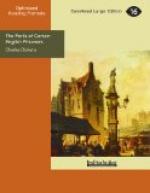We thanked the young lady, and said we didn’t wish to be troublesome; but, she said it could be no trouble to an English soldier’s daughter, to show English soldiers how their countrymen and country-women fared, so far away from England; and consequently we saluted again, and went in. Then, as we stood in the shade, she showed us (being as affable as beautiful), how the different families lived in their separate houses, and how there was a general house for stores, and a general reading-room, and a general room for music and dancing, and a room for Church; and how there were other houses on the rising ground called the Signal Hill, where they lived in the hotter weather.
“Your officer has been carried up there,” she said, “and my brother, too, for the better air. At present, our few residents are dispersed over both spots: deducting, that is to say, such of our number as are always going to, or coming from, or staying at, the Mine.”
("He is among one of those parties,” I thought, “and I wish somebody would knock his head off.”)
“Some of our married ladies live here,” she said, “during at least half the year, as lonely as widows, with their children.”
“Many children here, ma’am?”
“Seventeen. There are thirteen married ladies, and there are eight like me.”
There were not eight like her—there was not one like her—in the world. She meant single.
“Which, with about thirty Englishmen of various degrees,” said the young lady, “form the little colony now on the Island. I don’t count the sailors, for they don’t belong to us. Nor the soldiers,” she gave us a gracious smile when she spoke of the soldiers, “for the same reason.”
“Nor the Sambos, ma’am,” said I.
“No.”
“Under your favour, and with your leave, ma’am,” said I, “are they trustworthy?”
“Perfectly! We are all very kind to them, and they are very grateful to us.”
“Indeed, ma’am? Now—Christian George King?—”
“Very much attached to us all. Would die for us.”
She was, as in my uneducated way I have observed, very beautiful women almost always to be, so composed, that her composure gave great weight to what she said, and I believed it.
Then, she pointed out to us the building like a powder magazine, and explained to us in what manner the silver was brought from the mine, and was brought over from the mainland, and was stored here. The Christopher Columbus would have a rich lading, she said, for there had been a great yield that year, a much richer yield than usual, and there was a chest of jewels besides the silver.
When we had looked about us, and were getting sheepish, through fearing we were troublesome, she turned us over to a young woman, English born but West India bred, who served her as her maid. This young woman was the widow of a non-commissioned officer in a regiment of the line. She had got married and widowed at St. Vincent, with only a few months between the two events. She was a little saucy woman, with a bright pair of eyes, rather a neat little foot and figure, and rather a neat little turned-up nose. The sort of young woman, I considered at the time, who appeared to invite you to give her a kiss, and who would have slapped your face if you accepted the invitation.




